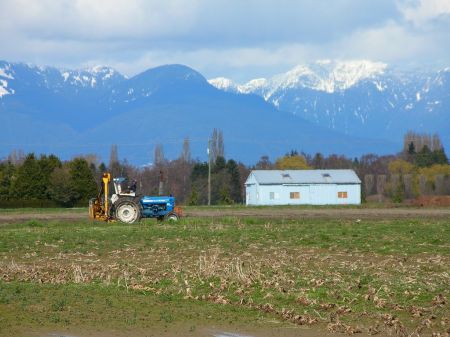STORY about EnvironmentFoodpublié le Juillet 14, 2009 by dawn
Richmond councillor stands up for farmland
Vancouver port expansion poses a bigger threat to food security than climate change

Photo: Stephen Rees. Creative Commons No Commercial, Attribution, No Derivatives license. https://www.flickr.com/photos/60142746@N00/3439387387
Also posted by dawn:
Also in Food:
A recent land sale has veteran farmland advocate Harold Steves worried that port expansion may be a bigger threat to food security in the Lower Mainland than climate change.
Steves, a Richmond councillor who helped found B.C.’s Agricultural Land Reserve as an MLA in the 1970s, said the expansion of Port Metro Vancouver is a threat to 8,000 to 9,000 acres of farmland in East Richmond.
In May, Port Metro Vancouver—formed by the amalgamation of the Fraser River Port Authority, the North Fraser Port Authority, and the Vancouver Port Authority in January 2008—purchased the 200-acre Gilmore Farm in Richmond, which is in the ALR.
“It is the key parcel for control of the entire ALR in Richmond,” Steves told the Straight.
The Gilmore Farm lies adjacent to other land owned by Port Metro Vancouver. This has led Steves and others to believe that it will be used for container storage, which they argue could undermine the viability of surrounding farms.
Port Metro Vancouver spokesperson Anne McMullin said that’s not going to happen—at least for now.
“We do not have any plans at this stage to change that piece of property away from agricultural land,” McMullin told the Straight by phone.
McMullin called the Gilmore farm a “strategic asset”. She said that Port Metro Vancouver “wants to ensure, certainly in the short term, that land up against port operations is maintained”.
The Gilmore farm has been leased back to its previous owners for the next five years. What’s planned for the property once the lease is up hasn’t been made public.
On June 26, the Metro Vancouver board approved a resolution objecting to the port’s purchase of the farm.
Steves vowed to fight any destruction of farmland by Port Metro Vancouver until his “dying breath.”
“In 1973, when we brought the ALR in, we were concerned that we were only producing 86 percent of our vegetables and small fruit,” Steves said. “Now, during WWII and after the war, we were producing 100 percent, so a drop down from 100 percent to 86 percent was significant. Today, we’re producing 43 percent. And that’s the problem.”
Steves also chairs Metro Vancouver’s agriculture committee. The committee received a staff report in April that shows warmer climates may increase the productivity of the region’s farms.
According to the report, which looks at the potential impact of climate change on agriculture in Metro Vancouver, warmer winter temperatures will give pests and diseases a better chance of surviving the cold, and rising sea levels will increase the possibility of flooding.
But the report also predicts that, by the 2050s, the growing season will be extended by two weeks at both its beginning and end, increasing the viability of bell pepper and melon crops, and allowing for double cropping.
That’s just more reason to preserve Richmond’s farmland, according to Steves.
“The end result is that it is warmer, so [unlike] the Interior of B.C., which is drier, and the Prairies, which are drier and less productive, we actually can increase crop production,” he said.
Reflecting on more than 40 years of campaigning for farmland, Steves said, “The issues are the same, the knowledge of climate change and running out of food is a little better, but we knew it was happening even then, and that’s what’s so frightening, is that we’ve done so little in such a long time.”
Photo of farmland in Richmond by Stephen Rees, CC2.0.
A version of this article was published at Straight.com.
The site for the Vancouver local of The Media Co-op has been archived and will no longer be updated. Please visit the main Media Co-op website to learn more about the organization.